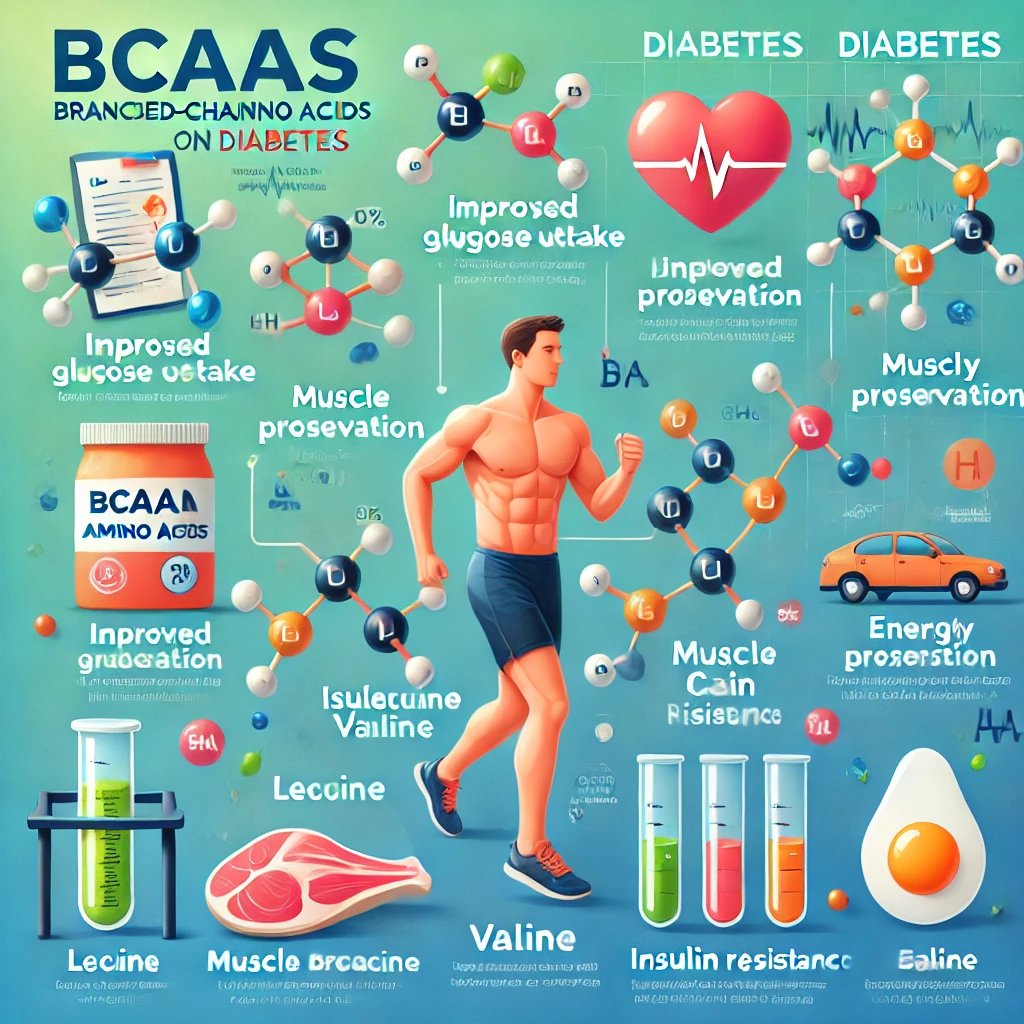Branched-Chain Amino Acids (BCAAs) — leucine, isoleucine, and valine — have gained attention for their potential impact on managing diabetes. While BCAAs are primarily known for their role in muscle growth and recovery, emerging research suggests they might influence glucose metabolism, insulin sensitivity, and overall diabetes management. However, their effects are complex and vary depending on individual health factors.
Benefits of BCAAs for People with Diabetes
- Improved Glucose Uptake:
- Isoleucine, one of the BCAAs, plays a role in enhancing glucose uptake in cells and improving glucose metabolism.
- This can help regulate blood sugar levels and reduce post-meal spikes.
- Muscle Maintenance:
- Diabetes often leads to muscle loss or sarcopenia due to insulin resistance and chronic inflammation. BCAAs, particularly leucine, stimulate muscle protein synthesis and preserve lean muscle mass.
- Energy Production:
- BCAAs provide an alternative energy source, which is particularly beneficial during workouts or fasting, helping stabilize blood sugar levels.
- Potential for Reducing Insulin Resistance:
- In some studies, moderate BCAA supplementation has been linked to improved insulin signaling pathways, potentially reducing insulin resistance.
Potential Negative Effects of BCAAs for Diabetic Individuals
- Risk of Insulin Resistance:
- Excessive consumption of BCAAs, especially without adequate physical activity, may contribute to insulin resistance in some individuals.
- This is because elevated BCAA levels in the blood have been associated with impaired insulin sensitivity in sedentary individuals.
- Impact on Blood Sugar Levels:
- If not balanced with other dietary components, BCAAs could cause fluctuations in blood sugar levels.
- High doses of leucine might stimulate insulin release, which could be problematic for individuals with Type 2 diabetes if not monitored properly.
- Increased Risk of Obesity:
- Overconsumption of BCAAs may lead to weight gain, which can exacerbate Type 2 diabetes.
Who Should Consider BCAAs for Diabetes?
- Active Individuals with Diabetes:
- Those engaging in regular exercise may benefit from BCAA supplementation to enhance recovery, preserve muscle mass, and regulate energy levels.
- Diabetic Individuals with Muscle Loss:
- People experiencing sarcopenia or muscle wasting due to diabetes can use BCAAs to support muscle protein synthesis.
- Controlled and Monitored Use:
- BCAAs may be useful when taken in moderate doses and under the guidance of a healthcare professional or dietitian.
Recommendations for Diabetics Considering BCAAs
- Consult a Healthcare Provider:
- Always consult with a doctor or dietitian to ensure BCAAs are safe and suitable for your specific health condition.
- Pair with Physical Activity:
- To maximize benefits and reduce risks, BCAAs should be paired with regular exercise.
- Moderate Dosage:
- Stick to recommended dosages (5-10 grams per day) to avoid potential negative effects on insulin sensitivity.
- Focus on Natural Sources:
- Incorporate natural BCAA-rich foods like chicken, eggs, and soybeans into your diet for a balanced approach.
Conclusion
BCAAs can be a useful tool for people with diabetes, particularly for preserving muscle mass and improving energy levels. However, the relationship between BCAAs and insulin sensitivity is complex and varies among individuals. Moderation, physical activity, and professional guidance are essential to ensure their safe and effective use in managing diabetes.










